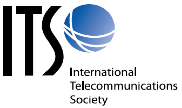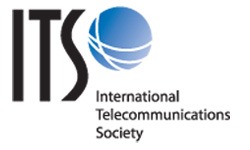Call for Papers
ITS 33rd European Regional Conference 2025
Call for Papers

33rd European regional conference of the International Telecommunications Society
Digital innovation and transformation in uncertain times
30th June and 1st July 2025, Edinburgh, UK
We are in the midst of a period of rapid digital transformation. Artificial Intelligence (AI) has grabbed many headlines – its capabilities have rapidly and significantly developed, fuelled by significant investment by Big Tech. AI is permeating the whole economy, promising far-reaching changes in the production and dissemination of content. But as AI diffuses across the economy, it raises issues around how content is created and its ownership. And AI created deepfakes have emerged, questioning how online content is policed as well as its veracity determined. AI also raises concerns about privacy, especially as large amounts of data are integral to its development.
While Big Tech has been heavily investing in AI, their existing businesses have been challenged by regulators. Regulatory initiatives, emanating from the European Union (EU) and the United States, have resulted in new obligations being imposed, large fines levied and the possibility of structural changes raised. And the EU has eventually, after many years, won its case against Apple over the tax advantages associated with its base in Ireland. These developments collectively question the basis on which Big Tech operates, in terms of their dominance of key markets as well as how they integrate their services to create a seamless experience for users.
Although Big Tech captures many headlines, due to their size, resources and business models, the platformisation of many parts of our economy and society is well under way. Through providing services that enhance the customer experience, there are many benefits associated with platforms. However, sectors may become dominated by one or a handful of platforms, raising competition concerns, and may not operate in all geographical markets. Furthermore, for individuals, as well as businesses and public organisations, to benefit from platforms they need to possess a number of relevant digitals skills and an appropriate technological infrastructure. Digital literacy is particularly important if individuals are to maximise the benefits that they accrue from using platforms, while businesses and public organisations need to thoroughly transform their operations so that digital technologies are embedded within everything that they do. Continued technological change ensures that individuals and organisations need to continually invest in their digital skills, literacy and devices if they are to continue to enjoy the digital economy that is emerging.
Although the roll-out of 5G is well under way, at least in western countries, questions remain regarding how operators will monetise this generation of mobile technologies and recoup their considerable investment in infrastructure. Some of the numerous use cases may come to fruition, but there is chance that mobile operators will struggle to persuade their users of the merits of 5G. And as attention increasingly turns to 6G, whose development is well under way, has the curse of the odd generation struck once more?
Other parts of the telecommunications value chain are subject to uncertainty. The muted take-up of 5G in western countries will impact the equipment manufacturing sector, heightening discussion of whether the current model of a new mobile generation every decade is needed as well as raising concerns around the sustainability of vendors. Since the widespread liberalisation of the telecommunications industry at the start of the 1990s, manufacturing companies have experienced change – extensive structural changes have occurred, not least prompted by the emergence of new actors in the field. Some of these new actors are broad in scope, while others focus on a specific activity such as design of chips or the assembly of devices for someone else.
Qualcomm’s discussion of bidding for Intel took most by surprise. The bid illustrates the continued challenges faced by manufacturers, especially those requiring large capital investments, in a global market increasingly shaped by national technology strategies and priorities. The bid also illustrates the varying fortunes of manufacturing companies more generally, with two shifts being evident: from western to Asian firms on the one hand, and from manufacturing to IP focused on the other. Not only does this question the plurality of the sector, but it complicates the desire and ability of many countries to achieve a degree of ‘strategic autonomy’ in key parts of the manufacturing sector.
We specifically welcome submissions on digital innovation and transformation, within the EU as well as elsewhere. In addition, we welcome submissions on a range of topics as outlined below:
- Artificial Intelligence (AI) – different types of AI, their socio-economic impact and how they will be used in specific industries and contexts
- 5G – roll-out, adoption and the development of (new) business models by operators and verticals
- Participation and the use of ICT by marginalised groups
- The digital transformation of places and communities: smart cities, smart villages and smart territories
- The challenges of cyber-security when digital ecosystems are complex, evolving and global
- Online misinformation – what it is, how can it be tackled and what role does digital literacy play?
- Regulation of the digital economy – antitrust, international collaboration between regulatory agencies, exporting regulatory initiatives
- The role, scope and operation of the International Telecommunications Union and World Radiocommunication Conferences
- Satellites – operators, operation and performance, managing and dealing with debris
- The last impact of Covid-19 – the interplay between working from home, networks and digital skills; emergence of new digitally mediated business models and technology use in different industries
- Techno-nationalism – protectionism in equipment and software markets, regulatory response, industrial policies
- Place-based approaches to policymaking of digital transformation – the role of municipal and regional governments in regulating AI and other technologies
- Digital skills – identifying and then providing the skills needed to participate online, for individuals and businesses
- Green ICT – within specific parts as well as across the whole of value chain(s)
- Innovative ways of providing digital services and digital infrastructures in remote and rural areas
Submissions addressing any other subject relating to telecommunications technologies and markets are also welcome. Theoretical and empirical papers are welcome, as are methodologically qualitative and quantitative papers.
Submission of abstracts:
Abstracts should be about 2 pages (800 to 1000 words) in length and contain the following information:
- Title of the abstract / panel session
- A clear statement of the research question
- Remarks on the methodology adopted in the paper
- Outline of (expected) results
- Bibliographical notes (up to 6 key references used in the paper)
Abstracts should be submitted via EasyChair. If you do not already have an account, you will need to create one. Existing accounts can be used to submit your abstract.
Please submit your abstract via:
![]() https://easychair.org/conferences/?conf=its2025
https://easychair.org/conferences/?conf=its2025
All abstracts will be subject to blind peer review.
Student paper competition:
We encourage submissions from students. Those authors wishing to participate in the student competition should submit their abstracts as normal, but are required to submit the full paper earlier than other participants – see below.
Important dates:
Local Organizer
Dr Paolo GERLI
Edinburgh Napier University, Edinburgh, UK
p.gerli@napier.ac.uk
ITS Europe
Dr Volker STOCKER
Weizenbaum Institute for the Networked Society & TU Berlin, Berlin, Germany
vstocker@inet.tu-berlin.de
Professor Jason WHALLEY
Northumbria University, Newcastle, UK
jason.whalley@northumbria.ac.uk
